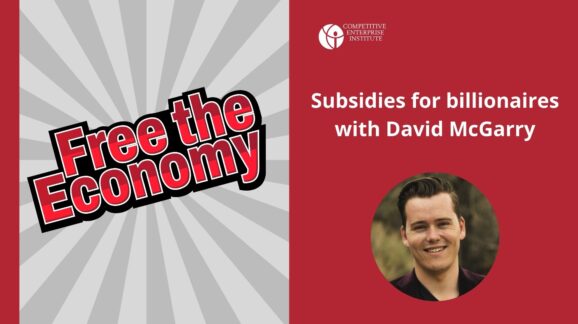There are two main areas in which Congress can enact meaningful reform. The first is to rein in regulatory guidance documents, which we refer to as “regulatory dark matter,” whereby agencies regulate through Federal Register notices, guidance documents, and other means outside standard rulemaking procedure. The second is to enact a series of reforms to increase agency transparency and accountability of all regulation and guidance. These include annual regulatory report cards for rulemaking agencies and regulatory cost estimates from the Office of Management and Budget for more than just a small subset of rules.
In 2019, President Trump signed two executive orders aimed at stopping the practice of agencies using guidance documents to effectively implement policy without going through the legally required notice and comment process.
Featured Posts

Blog
Free the Economy podcast: Subsidies for billionaires with David McGarry
In this week’s episode we cover White House intervention in corporate ownership, the nation’s falling economic freedom ranking, and welcome new…

News Release
Federal appeals court rules on NLRB unconstitutionality
The 5th Circuit Court of Appeals today issued a ruling suggesting the structure of the federal government’s top labor dispute regulator, the National Labor Relations…

Blog
The week in regulations: Import paperwork and postal possession
The 2025 Federal Register topped 40,000 pages. President Trump met with Vladimir Putin in Alaska. The Producer Price index rose at its fastest level since…
Search Posts
News Release
#NeverNeeded Report: Systemic Regulatory Reform Will Aid Economic Recovery from COVID-19
Policy makers at all levels of government have waived more than 600 regulations, including rules impeding access to medical care and making the economic shock…
Blog
New #NeverNeeded Paper: Regulatory Reform
Regulatory reform is one of the most important policy responses to the COVID-19 crisis. Removing obstacles to health care can save lives. Removing barriers against…
Study
How to Make Sure Reformed #NeverNeeded Regulations Stay That Way
Policy makers at all levels of government have waived more than 600 regulations in response to the COVD-19 crisis.[1] Those rules were…
Blog
The E.O. 13891 Guidance Document Portal: An Exercise in Utility
Federal agencies have been required by Executive Order 13891 to create “a single, searchable, indexed database that contains or links to all guidance documents in effect.” Agencies…
Blog
This Week in Ridiculous Regulations
The USMCA trade agreement came into effect on July 1, and three states increased their minimum wages. The unemployment rate went down to 11.1 percent.
Blog
Trump’s Regulatory Reform Agenda by the Numbers, Summer 2020 Update
The administration released the Spring 2020 Unified Agenda of Federal Regulatory and Deregulatory Actions. Its purpose is to lay out regulatory priorities of the federal…
Staff & Scholars

Clyde Wayne Crews
Fred L. Smith Fellow in Regulatory Studies
- Business and Government
- Consumer Freedom
- Deregulation

Ryan Young
Senior Economist
- Antitrust
- Business and Government
- Regulatory Reform

Fred L. Smith, Jr.
Founder; Chairman Emeritus
- Automobiles and Roads
- Aviation
- Business and Government

Sam Kazman
Counsel Emeritus
- Antitrust
- Automobiles and Roads
- Banking and Finance

Marlo Lewis, Jr.
Senior Fellow
- Climate
- Energy
- Energy and Environment